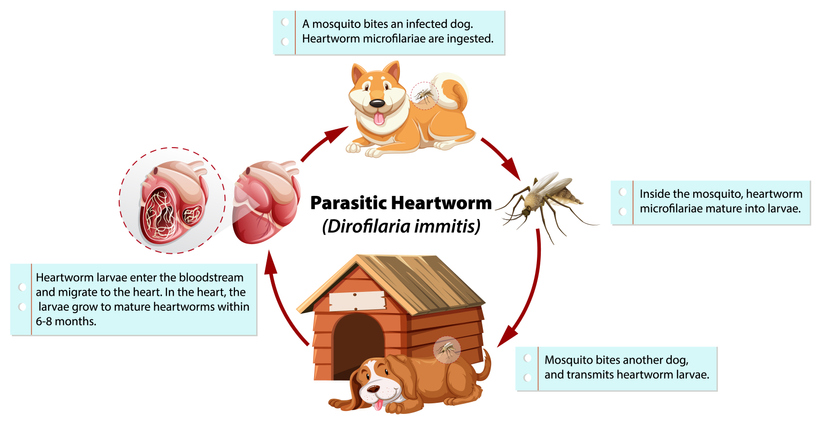Why do dogs need heartworm medication?
We’ve got the low-down on heartworm medication for dogs, and what, when and why you should use it

Is your dog on heartworm medication? They should be! Heartworm is a serious and potentially fatal disease caused by the parasite Dirofilaria immitis. These worms are spread via bites from an infected mosquito: just one bite is all it takes! Sadly, heartworm disease is now present in all fifty states of the US and many other parts of the world. According to the 2019 American Heartworm Incidence Survey, more than a million pets in the U.S. have heartworms. The states with the highest prevalence were Mississippi, Louisiana, South Carolina, Arkansas and Alabama. Heartworms damage the heart, lungs and blood vessels, causing coughing, exercise intolerance and potentially death. Thankfully, prevention is easy and cheap.
What is Heartworm in Dogs? What Causes Heartworm?
‘Heartworm’ is the parasitic worm Dirofilaria immitis. ‘Heartworm disease’ is the disease caused by infection with this worm. It can only be spread by a mosquito bite. Heartworm disease is not contagious; which means that dogs cannot transmit heartworm to other dogs, nor to humans. (Cases of heartworm in humans are very rare. Humans are not ‘natural hosts’, meaning the worm cannot complete its lifecycle in humans.)

A mosquito becomes infected by biting an infected mammal and ingesting heartworm larvae. The larvae then undergo an incubation period in the mosquito while they develop to the infective stage. The next time the mosquito bites a dog, the dog becomes infected. The larvae spend around two months maturing and migrating to the bloodstream and to the heart, becoming mature adults in 4-5 months. Each worm can live for up to 7 years in your dog; and can grow up to 12” long! Once mature they will be mating and releasing microfilariae (offspring) into the dog’s bloodstream to start the cycle again.
What are the symptoms of heartworm in dogs?
Symptoms of heartworm are very unpleasant and include coughing; lethargy; a decrease in appetite; weight loss and exercise intolerance. More severe symptoms include difficulty breathing; a fast heart rate; heart failure; anemia; collapse; a swollen belly due to fluid build-up and death. The disease is classified into four stages:
Stage 1: A positive heartworm test but no symptoms
Stage 2: Moderate symptoms
Stage 3: Severe symptoms
Stage 4: ‘Caval syndrome’: this is where a valve in the heart gets blocked due to a heavy worm burden. Sadly, the only treatment for this is surgery and is often fatal, even with treatment.
Heartworm diagnosis and treatment: Is heartworm treatment safe?
I cannot stress this enough: the best treatment is prevention! Heartworm disease can cause permanent damage to your dog’s insides. Plus, treatment can be very expensive and take months to complete, during which your dog would need strict rest and multiple veterinary hospital visits. The treatment is also not particularly pleasant!
We asked the President of American Heartworm Society, Dr Chris Duke, if heartworm treatment is dangerous. He replied “The more appropriate question is: is heartworm disease dangerous? Without a doubt. Think about the fact that these worms literally live and breed within the bloodstream of a dog, in the rich environment of the pulmonary arteries just above the right heart.”
How is heartworm in dogs diagnosed?
Diagnosis involves blood work to look for evidence of heartworms in your dog’s body and to assess internal damage; alongside x-rays and echocardiography (a heart scan with an ultrasound machine) to assess the lungs and heart.
What type of heartworm medications treat heartworm in dogs?
Treatment is ‘multimodal’ and takes months. In moderate to severe cases your dog would need to be stabilized in hospital before treatment could be started. This could involve steroids, a fluid drip and diuretics (drugs to help remove excess fluid buildup).
Doxycycline, an antibiotic, is usually given for four weeks before melarsamine (the main treatment, see below) as it can sterilize the adult worms, thus breaking the cycle. It also reduces the risk of post treatment complications by killing a bacteria carried by the worms. A heartworm preventative is also given for two months prior to melarsamine, in order to reduce new infections.
The main treatment is melarsomine, an arsenic-containing injectable adulticide (meaning it kills adult worms). The injection has to be given deep into the muscle and can cause soreness and swelling at the injection site. Three injections are given at intervals. The veterinarian will often give pain relief during the course of these injections to ease discomfort.
Complications of treatment include blood clots forming in the lungs and shock. The American Heartworm Society state that “Exercise restriction during the entire treatment and recovery period is ESSENTIAL for minimizing cardiopulmonary complications, as there is a distinct correlation between the activity level of the dog and the severity of disease”. Dr Chris Duke himself confirms “Most complications I have witnessed from adulticide therapy have been because of excessive activity of the patient post-treatment”.
There are no herbal remedies for heartworm that have been proven to work. There is no scientific basis to the claims that cider vinegar can treat heartworm. If left untreated, heartworm disease will be fatal as a result of the damage it causes to the heart, lungs, kidneys and liver.
Again, prevention is better (and nicer!) than cure so please read on!
Heartworm prevention: What is it and why is it important?
The American Heartworm Association advocates “Think 12! … Administer heartworm preventives 12 months a year and test pets for heartworm every 12 months.” Annual testing is important, even if you are a responsible pet owner who keeps their dog on preventatives all year. We are all human, even missing one preventative dose can result in an animal becoming infected! Animals may also unknowingly rub off, spit out or sick up a dose.
There are many safe, effective and relatively inexpensive preventatives on the market. All of which need to be obtained with a veterinary prescription. You cannot buy heartworm prevention (or treatment) over the counter. These preventatives come in oral, topical and injectable (every 6-12 months) formulations, and some of them have the added benefit of protecting against other parasites at the same time. Heartgard Plus and Advantage Multi are two common heartworm preventatives that you can obtain from your veterinarian. Your veterinarian will be able to advise you on which is right for your dog. For example, some breeds such as Collies and Australian Shepherds can be sensitive to some formulations. They will also advise which other parasite prevention your dog needs.
HEARTGARD® Plus (Boehringer Ingelheim)
This is an oral heartworm preventative effective against heartworm larvae. It also protects against hookworms and roundworms. The active ingredients are Ivermectin + pyrantel pamoate.
Advantage Multi® (Bayer)
This is a ‘spot on’ containing moxidectin + imidacloprid. It works against the larval and microfilariae (offspring) stages. It also covers fleas, hookworms, roundworms, whipworms and sarcoptic mange mites.
When should I give my dog heartworm medication?
You’re probably asking, “Do I need to use preventatives all year round since it’s spread by mosquitos, which are seasonal?” The simple answer is yes! Firstly, and most importantly, global warming has meant that mosquitos are active for an increasing number of months. This means ‘safe’ months have become very hard to predict. Secondly, heartworm prevention commonly also protects against other parasites, which you’ll still need to be protecting against even in the ‘off’ season for heartworms. Lastly, studies have shown that missing a few months (intentionally) increases the risk of forgetting doses at other times, leaving your dog vulnerable.
Adjunctive preventatives, such as mosquito repellents, can also decrease the risk of your dog being infected. Your veterinarian will be able to advise you as to the best one for your dog.
Heartworm disease is preventable, and prevention is better than cure
Heartworm disease is serious. It can cause lasting damage to your pet and potentially result in death. Remember the American Heartworm Society’s wise words: get your dog tested every 12 months; and make sure your heartworm prevention covers your dog for 12 months. I’ll leave you with President Dr Chris Duke’s words: “The most important thing I would like to leave you with is that heartworm prevention is the key… Think of heartworm prevention as an insurance policy against a severe, yet preventable disease.”
Credit, and further information can be found at:
PetsRadar Newsletter
Get the best advice, tips and top tech for your beloved Pets
After graduating as a vet from the University of Nottingham, Dr Joanna Woodnutt went on to practice companion animal medicine in the Midlands. Since then, she has also written for countless online and print publications and is a regular contributor for Edition Dog Magazine.

